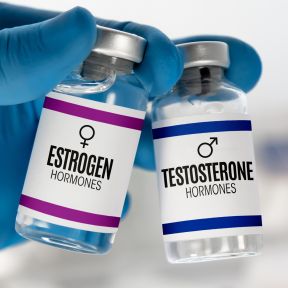
Testosterone
The sex hormone testosterone plays a more significant role in the life of a male, but it is present in both sexes to some degree. Despite popular perceptions that testosterone primarily controls aggression and sex drive—although it does play a role in both of those things—research has shown that individual levels of testosterone are also correlated with our language skills and cognitive abilities.
Testosterone occurs in the body naturally, but can be administered as a medication, too. Its most common uses are in the treatment of hypogonadism and breast cancer, as well as in gender affirming hormone therapy to support transitioning.
When many people think of someone with a high level of testosterone, they may picture a man loaded with strength, sexual prowess, and machismo. But while high-T has been correlated with all those things, it’s also been correlated with status-seeking, dominance, aggression, sexual misconduct, and violence.
One of testosterone’s most common uses—as a performance-enhancing steroid—illustrates both sides of the hormone. Injecting steroids can be a quick way for athletes to dramatically improve performance, but the side effects can also be extreme, and can include excessive body hair growth, sexual dysfunction, and the hard-to-corral anger known as “roid rage.”
Testosterone influences a wide array of abilities and behaviors, prompting fluctuations in llibido, health, cognition, and language. Testosterone doesn’t only spur aggression—it can also inspire benevolent acts, research suggests. This provides evidence for the belief that testosterone might serve to encourage status-enhancement.
Sex drive is stronger in the typical man than in the typical woman, and testosterone helps fuel that desire—rising testosterone levels will lead to a stronger sex drive. Understanding hormonal differences between the sexes can help to create changes that prevent sexual harassment and assault, and create a more equitable society.
Scientifically establishing a direct link between testosterone levels and aggression has proved difficult. Various studies have identified males with high testosterone levels as being at greater risk for sexually assaulting women. But overall, unlike in non-human animals, the correlation between high testosterone and aggression in people, though positive, is weak.
Testosterone may boost attraction for conventional feminine features. In a randomized trial, men received a massage using gel with or without testosterone. Men dosed with testosterone rated women with typically feminine features—a small jaw, big eyes, high eyebrows—as more attractive than men who received the placebo.
Elevated testosterone has been linked to lower cognitive empathy, the ability to recognize what another person is thinking and feeling, in numerous studies. Testosterone’s influence on social decision-making may also be influenced by how it pertains to the ability to enhance the person’s status. However, the relationship is continuing to be explored.
Around 65,000 years ago, human behavior started to change. Our ancestors began making advanced tools, constructing sturdy houses, wearing elaborate clothing, and ultimately shifting toward modernity. In addition to language, researchers speculate that a drop in testosterone may have contributed to this advancement in civilization, as it led people to develop greater trust and care for others in the community.
Testosterone fluctuates according to age and life circumstance, often plummeting at the onset of parenthood, and spiking (for some) during moments of triumph. Romantic relationships, too, can impact a person’s testosterone production; though the reasons are still not fully understood, entering a relationship tends to increase women’s testosterone levels, while decreasing men’s.
Since males produce significantly more testosterone than females—about 20 times more each day—females can be more sensitive to these fluctuations. High levels of testosterone, particularly in men, have been correlated with a greater likelihood of getting divorced or engaging in extramarital affairs, though a causal link has not been established.
Testosterone levels generally decrease with age, falling 1 to 2 percent each year. Therefore low testosterone is a much more common experience for older men than younger men. Other life changes can also lead hormone levels to fluctuate. For example, testosterone often dips after having a child, which research suggests raises the risk of postpartum depression for new fathers.
A testosterone deficiency leads to both sexual and physical changes. Men with low testosterone can have a low sex drive or erectile dysfunction, and they may experience hair loss, reduced muscle mass, exhaustion, irritability, or depression.
Around 2 percent of men have clinically low levels of testosterone, according to estimates from the American Urological Association. But it’s much more common in older men, because testosterone decreases with age; roughly half of men over age 80 have low levels of the hormone.
A testosterone deficiency is characterized as less than 300 nanograms per deciliter of testosterone in the blood. In these cases, men should consult with their doctor to see if they would benefit from testosterone therapy, in which the hormone is delivered through gel, patches, pellets, or injections.
Research suggests that certain nutrients can boost testosterone. Those foods include ginger, pomegranate, onion, oysters, leafy greens, olive oil, and fish such as tuna or mackerel.
Transgender men and non-binary individuals often take testosterone in gender affirming hormone therapy. Testosterone can be delivered through injections, gel, or patches and will gradually yield physical, sexual, emotional, and reproductive changes. The decision to begin testosterone is a personal one, and healthcare professionals can provide support throughout the process.














